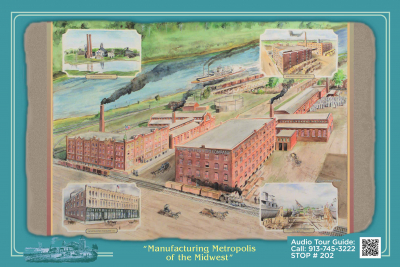Wayside Tour #2: Manufacturing Metropolis of the Midwest
Historic Wayside Tour #2 - Manufacturing Metropolis of the Midwest
In the late 1800s and early 1900s, Leavenworth was the most important manufacturing city in Kansas and one of the largest in the United States. It had 67 prosperous and growing industries. It was third in furniture production in the United States, had the second largest mill-machinery plant in the country, second in the manufacturing of stoves, had a large washing machine manufacturing company, had the largest manufacturer of amusement rides and produced over 250,000 tons of coal within the city limits. Leavenworth's coal mines, like the one shown at the top left corner, were an important industry in the late 1800s. Many stoves made in Leavenworth radiated warmth from the bituminous or soft coal found hundreds of feet beneath the city. On October 20, 1869, a vein of coal approximately two feet thick was found at a depth of between 700 and 800 feet. A second thicker vein was discovered at approximately 1,000 feet and a third vein 30 inches thick was found some 100 feet further down. The discovery of coal gave rise to the industrialization of Leavenworth.
Factory buildings became increasingly prominent in the city's landscape through the 1880s. The factory shown at the top right is the Abernathy Furniture Company opened in 1856 as Abernathy Brothers. By the 1870s the company reserved the back section of the city directory to illustrate their extensive line of furniture, including chairs, bedsteads, chamber sets, bureaus and mirrors. For a time in 1876 Abernathy Brothers also produced coffins and coffin trimmings. The Missouri Valley Shipyards, shown at the bottom right employed over 500 residents during World War II who worked to fill U.S. Navy contracts for more than 200 landing crafts. Because of their exceptional work the company received the Army-Navy "E" award for meritorious service in the building of landing craft. A photograph printed in the Leavenworth Times on June 18, 1994 shows LCT 763, built in Leavenworth, participating in the June 6, 1944 landing of Allied forces at Normandy on the coast of France.
The building shown at the lower left is the Ackenhausen Saddlery Company, which was located on the southwest corner of Second and Delaware. They manufactured Sunflower Harnesses and Saddlery. Owned by Charles Ackenhausen, a German immigrant, the Ackenhausen Saddlery Company was an essential business for the wholesale and retail of fine hand made saddles and all other articles pertinent to the horse and carriage days. From the beginning of a small foundry and machine shop in 1857 emerged two firms, The Great Western Stove Company and the Great Western Foundry and Mill Machinery Works. The foundry was established to manufacture steamboat parts, but within a short period began casting wood burning stoves. The Great Western Stove Company of the 1870s had two foundries and its furnace yielded 15 tons of iron daily. In 1936, the Great Western Stove Company was still making coal, wood and gas burning stoves and ranges of all kinds under the trade name Banquet. The stove company closed in the early 1940s. The stoves produced by the Great Western Stove Company are prized today by antique collectors and letters of inquiry are received to this day at the Great Western Manufacturing Company as to the availability of replacement stove parts. There are none. The Great Western Foundry and Mill Machinery Works incorporated in 1886 and became known as the Great Western Manufacturing Company. The center picture above displays how massive this company was. It continued production through the twentieth century and remained in one of its early buildings until 1985, when it moved to a site that was more suited to its production as 2017 South 4th Street. Today the company makes sifters and related equipment that is widely used in milling cereal grains, baking, chemical processing and mining.
A number of flour mills were started in Leavenworth soon after the city formation. Flour milling continued into the twentieth century, operated by the Leavenworth Milling Company at 415-421 Choctaw and by the Lysle Milling Company at Sixth and Choctaw. The Bay State Milling Company purchased the Lysle Milling Company in 1954 to mill flour shipped in bulk form by rail to commercial bakeries. Some of the other manufacturing companies that were in business at the turn of the century were: The Fisher Machine Works at 219-225 Cherokee, manufacturer of Corliss Engines and Ice Machinery. The Goodjohn Sash and Door Company operated on Broadway between Delaware and Cherokee and later expanded into the former Helmers Furniture Manufacturing Company plant at Third and Santa Fe. The Missouri Valley Bridge and Iron Company, builders of bridges for railroad expansion in the west and southwest, was located at Lawrence Avenue and Pennsylvania. The M. A. Kelley Broom Company at 907 Miami. The Boss Company, a glove manufacturer, at the northwest corner of Fourth and Second.
In 1910, C. W. Parker moved into the two-story brick factory at 1901 South Fourth but a gradual decline in sales over the next three decades ended with the purchase and conversion of the building in 1939 to automotive battery manufacturing by Gould, Incorporated.



